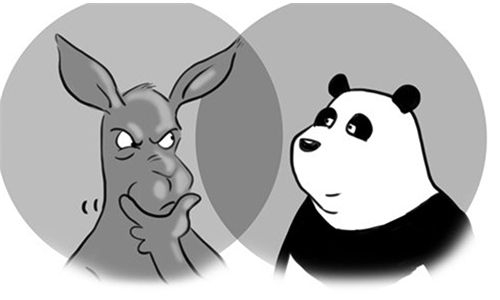
Australia Photo: VCG
China-Australia ties have entered "uncharted territory," Peter Cai, an expert from Australia-based think tank Lowy Institute, was quoted as saying on Sunday by Nine News, Australia's national news service. He said China's previous trade disputes with other countries were "limited in duration and scope," but this is not the case with Australia."Uncharted territory" mirrors the high degree of uncertainty in the Beijing-Canberra relationship. But when he said "we've never seen anything like this," hinting the severity of the China-Australia row may be even worse than that between China and the US, this is exaggerated.
It is true that the deteriorating ties between China and Australia won't change any time soon due to Australia's misjudgment of China's strategic intentions and misunderstanding of China. The relationship has indeed become bogged down in the worst time since the 21st century.
But the complexity of China-Australia disputes is far from that between China and the US. As US elites believe, China-US rivalry is about competing for strategic dominance, rules-making power across the globe, the ability to set the standards of worldwide trade and investment, and the race in cyberspace, science and technologies. Australia has no such concerns. One should therefore not be too pessimistic about China-Australia relations.
The key to the relationship lies on how they define one another's identity and position in their own diplomatic strategies. If Australia keeps blindly sticking to the mentality that China is attempting to interfere in Australia's domestic affairs and challenging the current world order, it will hardly adjust its China policy. China considers Australia an anti-China pioneer, who may carry out more ill-disposed moves in the Asia-Pacific region. So it will unlikely adopt a friendly policy toward Australia either.
Nevertheless, the trade frictions between the two may not continue to worsen, as the two sides have no intention to completely destroy their ties in energy and resources.
However, it should be noted when Nine News quoted Cai as analyzing bilateral ties, it underlined the 100th anniversary of the founding of the Communist Party of China (CPC). This shows some conservative politicians, media and scholars in Australia cannot help but treat China through an ideological lens. When they try to understand China's foreign policy, they always, intentionally or unintentionally, emphasize that China is a communist country governed by the communist party.
But China's foreign policy is aimed at creating a peaceful, stable and favorable international environment for the Chinese nation's great rejuvenation. This has nothing to do with ideology. The continuous deterioration of China-Australia relations is not due to the so-called Chinese nationalist sentiment or China's tough foreign policy, but due to the bad anti-China political atmosphere in Australia's domestic politics.
Australia misunderstands China's strategic intent, as well as China's strategic direction. China-Australia ties cannot go back to the past. But the foundation of cooperation still exists, especially in the economic and trade field. To get out of the "uncharted territory," resuming high-level strategic dialogue is needed. Australia should avoid the over-interpretation of China's strategic intentions.
Nine News quoted another Australian expert as saying China-Australia relations "will not improve unless something happens with the Biden administration." In their eyes, the US is the most vital third-party factor in China-Australia ties, as if this round of deterioration in China-Australia relations is to a large extent connected with the US.
It needs to be clear that although the Trump administration proactively promoted decoupling and confrontation with China, it has few followers in the Asia-Pacific region. Australia is one of the few allies which coordinated closely with the US to gang up on China. The Australian scholar seems to defend the Australian government as if the country's anti-China stance is solely the result of pressure from the US government.
Yet, Australia is a sovereign country. It is capable and rightful to craft its foreign policy based on its own interests. Pressure from a third party should not be the excuse of Australia to adopt anti-China policies.
China is a major power with a vast domestic market. It is the world's biggest consumer market. Its strategic capability and strategic resources are incomparable to those of Australia. Australia does not want to be trapped in the "uncharted territory" for long. It worries if China-US relations get better prior to the improvement of China-Australia ties, Canberra would be caught in an embarrassing and passive position.
To avoid the "uncharted territory," Australia should take the initiative to reduce the disturbances from ideological and values differences on bilateral ties, rectify its negative understanding of China, abandon anti-China policy, proactively engage with China and reset bilateral relations.
The author is an adjunct researcher at the Center for Australian Studies, China University of Mining and Technology. opinion@globaltimes.com.cn



